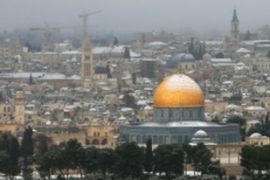Outrage over new Israel settlements
US, EU and Egypt join Palestinians in criticising expansion plans in east Jerusalem.

Instead of focusing on the peace process, [Israel] focuses on settlement expansion,” he said.
Al Jazeera obtained a copy of a letter in which Qureia expressed his government’s anger and frustration to his Israeli counterpart Tzipi Livni.
“All such illegal activity continues to undermine our efforts to reach our common goal of a comprehensive peace treaty before the end of 2008,” he said.
He urged Livni to halt the construction, saying: “All Israeli settlement activity anywhere inside occupied territory … is completely rejected by us and the entire international community, and must be immediately stopped.”
Deaf ears
The Jewish state has, nevertheless, refused to halt construction in occupied east Jerusalem and major West Bank settlement blocs.
Regev, the Israeli spokesman, said Givat Zeev, a settlement near Jerusalem, is in the settlement “blocs” that Israel intends to keep, but also said Olmert could not have halted the construction even if he wanted to since the project was first approved in 1999.
“We would have faced serious legal problems from the developers” if the government tried to block the project, he said.
Olmert has been under heavy domestic pressure to allow settlement activity to proceed. Shas, an ultra-Orthodox party in his coalition, has threatened to topple Olmert’s fragile government if he makes too many concessions to the Palestinians.
Roi Lachmanovitch, a spokesman for Shas leader Eli Yishai, said their party had pressured Olmert to allow the Givat Zeev construction to resume.
In a radio interview, Yishai said the party is pushing a new plan to build 800 homes in east Jerusalem in response to last week’s shooting attack that killed eight young students at a Jewish seminary in the city.
The new homes would be built next to the Palestinian neighbourhood where the shooter lived. Yishai said the building was a symbolic response to “the murder of eight saints who died to sanctify God’s name.”
Condemnations
The US, EU, and Egypt have all criticised the latest Israeli settlement construction. The Arab League warned that the settlement projects put the negotiations within “a hair’s breadth” of failure.
Staunch ally the United States said the new construction was “unhelpful” to the peace process which was revived at a US conference in November but has yet to make much headway.
US and Western officials said ahead of a key meeting to assess compliance with the road map plan that Washington is not satisfied with the pace at which Israel is moving to implement the long-stalled peace plan.
The officials said Washington was particularly critical of Israel‘s decision to push ahead with Jewish settlement expansion on occupied land, a move they see as damaging to US-backed peace talks with the Palestinians.
On Monday, the United States criticised the new Israeli settlements but insisted the shaky peace process carry on during a visit by Livni, the Israeli foreign minister.
Sitting next to Livni, Condoleezza Rice, the US secretary of state, urged both Israelis and Palestinians to honour their obligations under the 2003 road map for peace, which calls for a settlement freeze and an end to Palestinian violence.
Road map
Though wary of publicly criticising Israel, a key ally, George Bush, the US president, is under mounting Arab and European pressure to take a firmer stance as monitor and judge of whether the sides are meeting their commitments under the 2003 road map.
The peace project calls on Israel to remove outposts and halt settlement activity, including so-called “natural growth” of those settlements, and asks Palestinians to crack down on armed groups.
The new construction plans came just days after the Palestinians temporarily suspended the peace talks in the wake of Israel‘s offensive in Gaza that ended last week and that left more than 130 Palestinians dead.
Qureia confirmed that Israel and the Palestinians were set to return to the negotiating table this week in a bid to advance the peace talks, which George Bush, the US president, hopes will lead to a deal by the end of the year.
Qureia said Salam Fayyad, the Palestinian prime minister, will meet Ehud Barak, the Israeli defence minister, and William Fraser, the US special envoy charged with monitoring the sides’ compliance with the road map, on Friday.
He said the settlement issue would be raised when Palestinian officials meet Fraser.